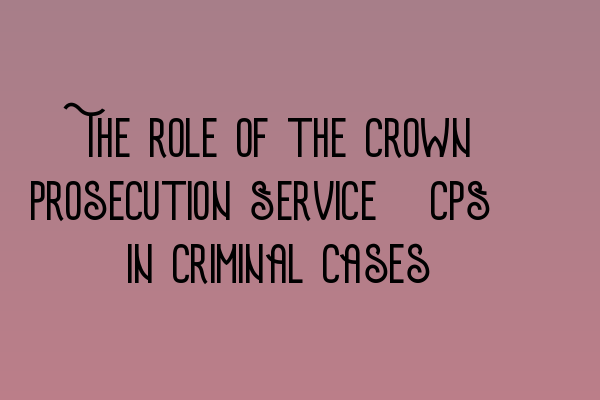The Role of the Crown Prosecution Service (CPS) in Criminal Cases
When it comes to criminal cases in the UK, the Crown Prosecution Service (CPS) plays a critical role. The CPS is an independent government agency responsible for prosecuting criminal cases that have been investigated by the police or other law enforcement agencies. In this article, we will explore the importance of the CPS and its functions in the criminal justice system.
One of the primary roles of the CPS is to review the evidence gathered by the police and make a decision on whether or not to proceed with a prosecution. This involves carefully assessing the strength of the evidence and determining if there is a realistic prospect of conviction. The CPS must ensure that there is sufficient evidence to provide a realistic prospect of conviction before taking a case to court.
Throughout the decision-making process, the CPS considers several factors, including the sufficiency of the evidence, the public interest in prosecuting the case, and any potential barriers that may arise during the trial. This balanced approach ensures that only cases with a reasonable chance of success are pursued, avoiding unnecessary strain on the court system and protecting the rights of the accused.
Once the CPS has decided to proceed with a prosecution, it takes on the responsibility of preparing and presenting the case in court. The CPS will work closely with the police and other relevant agencies to gather additional evidence, interview witnesses, and consult with experts if necessary. The goal is to build a strong and comprehensive case that stands up to scrutiny in court.
During the trial, the CPS acts as the representative of the prosecution, presenting the evidence against the accused and arguing for their conviction. It is the responsibility of the CPS to present a compelling case to the jury, ensuring that all relevant evidence is considered and properly presented. This includes calling witnesses, cross-examining the defense’s witnesses, and addressing any legal issues that may arise during the trial.
The CPS also plays a vital role in supporting the victims of crime throughout the legal process. They provide guidance, updates, and support to victims and witnesses, ensuring that their rights are protected and that they are kept informed about the progress of the case. This helps to alleviate the stress and anxiety often experienced by victims and witnesses, allowing them to participate fully in the criminal proceedings.
Furthermore, the CPS has a duty to act fairly and impartially, upholding the principles of justice and ensuring that all parties involved receive a fair trial. They must disclose all relevant evidence to the defense and act in accordance with the rules of evidence and legal procedure. By doing so, the CPS helps to maintain the integrity and credibility of the criminal justice system.
In conclusion, the Crown Prosecution Service (CPS) plays a crucial role in the UK criminal justice system. From the initial review of evidence to the presentation of cases in court, the CPS ensures that prosecutions are conducted fairly, based on sound evidence, and in the interest of justice. Their commitment to upholding the rule of law and protecting the rights of the accused and victims makes them an integral part of the criminal justice process.
Related Articles: SQE 1 Practice Exam Questions, SQE 1 Practice Mocks FLK1 FLK2, SQE 2 Preparation Courses, SQE 1 Preparation Courses, SRA SQE Exam Dates
